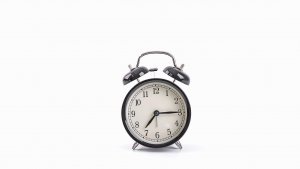Author of Future Brain: The 12 keys to create your high-performance brain
View Author ProfileMulti-tasking is a myth. In truth almost no one can do it. The secret to a productive day is organisationation, planning and focus - not scatter-gunning across several tasks. Here's how to really get more done in a day.
Opinions
10 Secrets Of A More Productive Life
Multi-tasking is a myth. In truth almost no one can do it. The secret to a productive day is organisationation, planning and focus - not scatter-gunning across several tasks. Here's how to really get more done in a day.

Multitasking, the myth beloved of parents everywhere that we can focus our attention on more than one task at a time, is a physiological impossibility, unless you happen to be in the one to two per cent of the population who are supertaskers and use a different part of their brain to divide attention.
We use our prefrontal cortex to focus attention. It is an extremely energy-hungry part of the brain and a confined space. While the received wisdom has been that we can hold up to seven (plus or minus two) items in the front of mind at any one time, this has been shown to be the case only for simple digits.
More complex items take up more thinking room, meaning we can probably hold onto only one or two ideas at any one time. Increasing focus to give an item our full attention limits the space to one.
When we attempt to multitask, our obliging brain helps by splitting the two items and allocating one to each hemisphere. Our hemispheres take the two items and alternate our attention between them extremely quickly.
"Regaining our attention and managing distractions is possible because we can exercise our attention just like a muscle"
This gives us the magical illusion that we are multitasking, when in fact we are just giving half our attention to each task, and probably messing each of them up quite effectively and thoroughly. In fact, studies by Rubinstein and others have revealed ‘multitasking’ can reduce performance and productivity by 40 per cent.
It is cognitively exhausting, reduces memory and is associated with an increased amount of error.
Strategies for focus
Want to be a high-performance thinker? Here’s the secret: monotasking. Do one thing at a time, give it your full and undivided attention, and do it well.
Regaining our attention and managing distractions is possible because we can exercise our attention just like a muscle. The more we practise, the better we get and sometimes just a few simple changes in our work practices can make a big difference.
Working smarter begins with choosing where to place your focus and creating the environment that best suits your attention-on brain.
Here are 10 leads on how best to create that environment.
Pick a quiet place to allow your brain to think in a less stressed state
Studies by Evans and Johnson have shown that noise is a stress and distraction that diminishes our ability to focus. Many people will tell you they can only work while listening to music.
They have trained their brain to tolerate the sound, but the brain is still stressed and does not habituate to noise. If you must have sound, make it music that you like but are not actively engaged with. Why? Because, paradoxically, music or other noise can be used as a focusing tool to block out other distractors.
Practise your focus, just as you would during a music lesson
Set aside 10 minutes to pay close attention to a task you do regularly. It could be reading, listening to music or preparing a meal. As you do the task consciously, think about what you are doing, and then test yourself on something you have learned.
Prioritise the following day’s work
By sorting out the next day’s top priorities before the end of your day, your mind is already focusing on the things to be done, even before you have arrived and started working on them.
Fight for three
Peter Cook, thought leader and author of The New Rules of Management, shares the wise advice that you fight to get your top three priorities done every day. Having identified what they are, choose to focus and work only on these until they are completed. This builds on Bob Pozen’s suggestion that we allocate 70 to 80 per cent of our working day to our top three priorities.
Manage your inbox
Bob Pozen’s advice is to respond immediately to email that merits it and junk the rest. He firmly believes in the OHIO principle: ‘Only Handle It Once’.
Schedule meetings for B- or C-class thinking time
Our best thinking times are brief. In other words, we have to treat our thinking time as an investment in quality, like really good wine.
If you do your best creative work in the morning, schedule appointments and meetings for the afternoon. As a rule, your best thinking time in any 24-hour period is most likely to be in the morning, usually the first three to four hours after getting up.
Unplug regularly
This means taking regular brain breaks, the pit stops necessary to fuel up for another lap of grand prix business performance. Don’t neglect regular technology breaks either.
In a study by Gloria Mark from the University of California and others in which office workers were denied access to their computers and smartphones for five days, it was found that while they complained bitterly at first, they then showed increased productivity. What’s more, individual blood-pressure readings went down and they subjectively reported feeling better and less stressed.
Play some video games, especially those fast, action-packed games are great for building attention
Daphne Bavelier, a neuroscientist, has shown how video games make our brain smarter, better, faster and stronger. While it is recognised that overplaying certain video games can lead to problems with addictive behaviour, for the vast majority, playing games for an hour or so several nights a week has a number of positives.
Gamers develop sharper visual acuity, which can help them pick out a stranger in a crowd and observe small details. They are also better at tracking more objects simultaneously. Games boost our attentional networks (alerting, orienting and executive), driving — you guessed it — plasticity. Gamers are also better at task switching with less cognitive cost compared with non-gamers.
Training on action games can help people improve their performance in difficult mental tasks, and this improvement persists for months after the training has finished.
Take regular holidays
Take a real vacation, without your laptop, computer tablet or smartphone, and rediscover the joys of conversation, of seeing the beauty of the world around you, and fully engage all your senses in your experience.
Avoid ‘multitasking’, or mythitasking
Yes, we know this is a no-brainer yet we all try to do it. Why? Because we think we can — we may even think we’re good at it — and we believe it saves us time and energy. It’s such a pity this is wrong at all levels.
This is an edited extract from Future Brain: The 12 keys to create your high-performance brain, by Dr Jenny Brockis, published by Wiley, £14.95.
Most read in Opinions
Trending articles on Opinions
Top articles on Minutehack
Thanks for signing up to Minutehack alerts.
Brilliant editorials heading your way soon.
Okay, Thanks!




